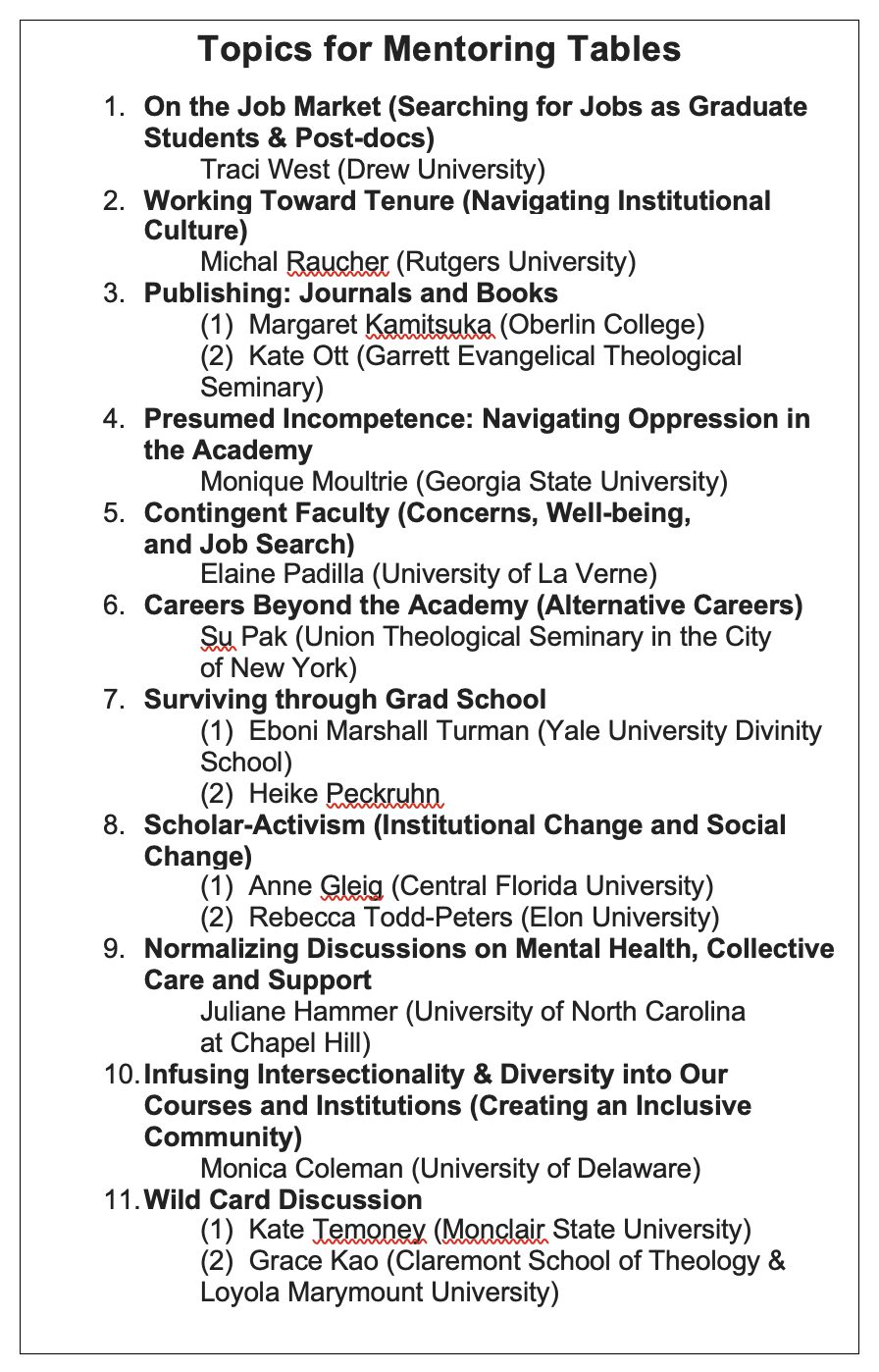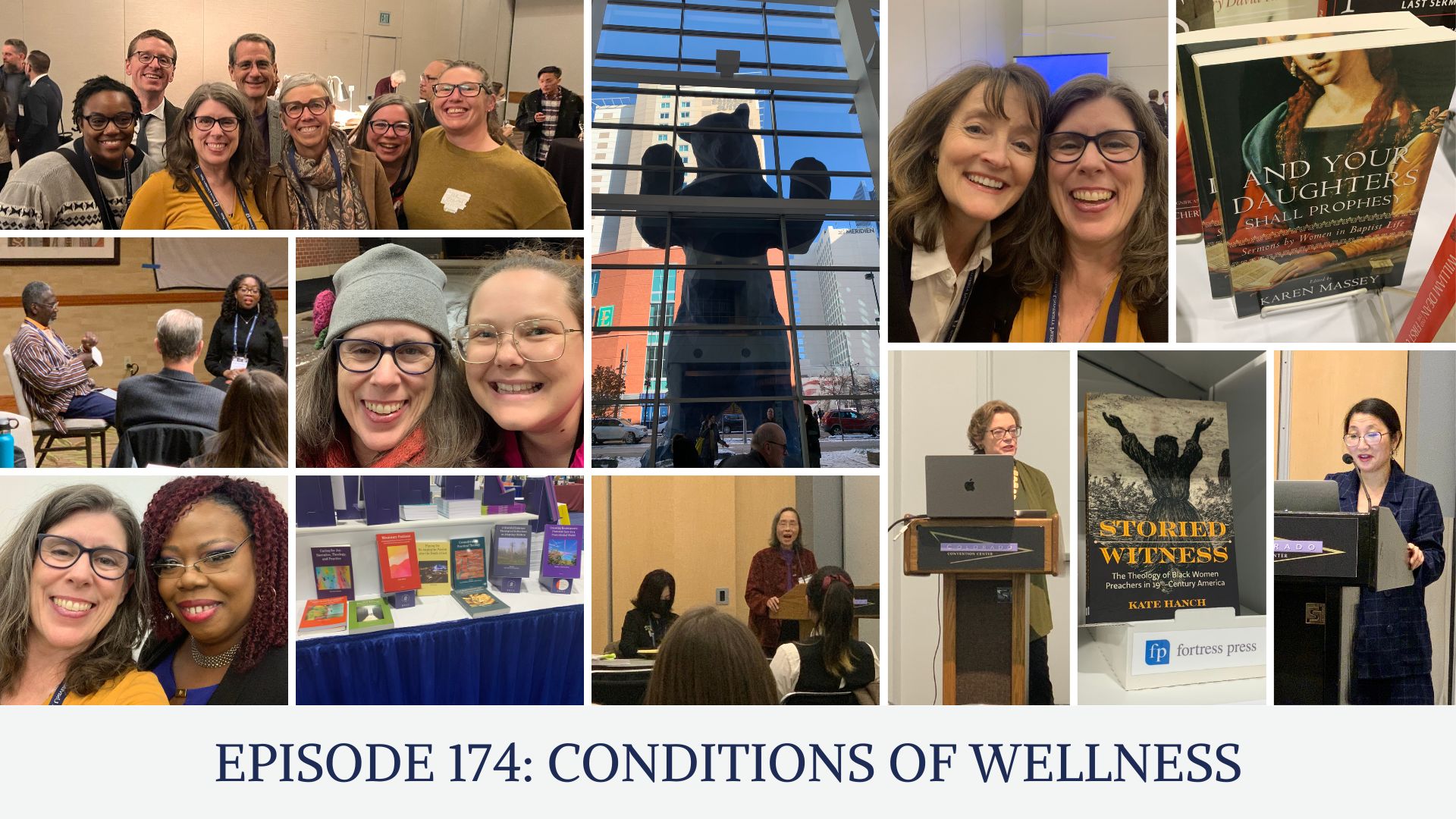What are the conditions of wellness that make life stable and meaningful? I considered this question over the past week while I attended the American Academy of Religion (AAR) in Denver, Colorado. Along with the Society for Biblical Literature (SBL), and other related publishers and groups, the meeting brings together close to 10,000 #religionnerds, #biblegeeks, and #theologyjunkies. We share our best ideas in the papers, argue with our comrades, snack on over-priced convention center granola bars, stay up late to see our grad school besties and frienemies, and hopefully find new motivation for our projects.
Conditions of Wellness for Women
I joined a mentoring table on Sunday of AAR for lunch. I sat down with women ranging in age from their early 30s to their early 80s to discuss “work-life balance” over boxed salads and sandwiches, chips and cookies. Work-life balance has never been one of my favorite bits of jargon. It was not even a table topic I planned to choose. Mainly because I thought several other topics sounded more appealing and urgent. Lots of topics offered are the everyday concerns of women in academe. (See the full list below.)
Nevertheless, the concept, in spite of its buzz-word popularity, is important. How we make a life, especially when we are part of failing and floundering rather than flourishing institutions, makes for urgent conversation. Even in relatively healthy organizations, women, and all workers, need strategies for resisting the ways capitalism pushes us to work all the time. Constant work is not a condition prone to wellness. The culture of overwork does greater harm two women of color, white women and men of color. Thus, conversations about these dynamics are critical.
One of our table hosts, professor Grace Kao reminded us of something she learned from Maria Schriver long ago. We can (possibly) have it all, but something will suffer or fall short in each season of life. We face deciding which area of our lives can go wanting for a time. More often the house, the weekend plans, or the publishing go begging. Less often we neglect children, elders, or teaching. Spouses and friends we depend on can also get short shrift. We trust these adults in our lives will love us in and out of season. Yet why should we have to neglect them? We need solid, dependable and loving relationships to have a quality of life.
+++++++

On (Not) Having it All
Dr. Kao and the other women at the mentoring table talked about raising children, caring for aging parents, traveling with pets, getting our writing done, navigating academic promotions, work, conferences, and evaluations for tenure and promotion. We shared stories and strategies with each other for how we are getting through it all.
(In this moment as I write, I realize I’ve never navigated a single promotion myself. This is true despite writing letters for others seeking tenure and promotion. And there are numerous times I accompanied friends and coaching clients to seek and earn advancement in seminaries and universities. I did once initiate and negotiate a change in title/position, although it included no additional pay beyond the planned cost of living raise. Only two people had to “sign off” on it. And that is how I became co-director after being associate director of the Learning Pastoral Imagination Project.)
For academic workers with serial jobs, grant funded positions, and/or contingent status, there is a whole other set of unstable conditions of our work. In a career like academia, where leaders make plans for future teaching and institutional change, not months but years in advance, we are constantly stepping into situations not of our own making. We are asked to fulfill the intentions and dreams of others with no promise beyond a one-year contract or three-year grant. The instability of these situations makes for chronic stress. These are hardly the conditions of wellness. The work of partners and spouses, side hustles, weekend gigs, and consulting if we’re lucky, are essential to fill in the gaps. To be sure, some people with part-time or contingent work in academia experience it as part of a larger family or partnership system that contributes to wellness.
More Stories about the Conditions of Wellness
Throughout the AAR meeting I sat at other tables where I caught up with friends and new acquaintances. And I heard (again) the realities of women living in a tangled relationship with the organizations and institutions that hire them. Or do not hire them. I felt in my bones how the frustrations and marginalizations of academia very much parallel the experiences of women leading (and leaving) the church.
Sometimes – perhaps most of the time – the problem is not with a woman’s ability or insight about the need for rest and time to take care of oneself and rest with one’s friends, partner, or family. The more pervasive and challenging problem is that workplaces fail to make this flexibility visible, if it is available at all.
We can’t simply blame people of color or women for not having enough “work-life balance”! Women of all ethnic identifications are, however, often blamed for whatever problems they are experiencing. And Black, Latin@ and Asian women often lack supportive structures and bosses even though they embrace strong ambition. It is as if they could just produce this so-called balance on their own. Yet the schools and churches and companies they work for have a little or no commitment to the quality of life of their employees.
A Surprising New Study
A new study about “work-life support” (so much better than “balance”!) gives us both better language and really strong evidence for how to improve conditions of wellness. The study reports that when you improve the conditions of wellness for all workers you’re not only increasing the quality of life of your employees, but you actually improve the likelihood workers will stay and you make more room for workers who are typically marginalized. This is exciting news, indeed.
Alexandra Kalev and Frank Dobbin report their study findings in “The Surprising Benefits of Work/Life Support: It’s a secret weapon for achieving organizational diversity.” They say in summary:
Analyzing data from more than 800 U.S. companies over 30 years, they found that when companies offered flexible work schedules, family leave, and childcare support to all employees, the percentage of women and people of color in management rose significantly. In fact, those work/life benefits had a larger impact than the most popular racial-equity programs did.
Churches and academic institutions possess great possibilities for offering white women and black, indigenous and people of color (BIPOC) flexibility that the study authors describe. Being more explicit and openly committed to that support would be a significant improvement. When it comes to funds for childcare and family leave, I can hear the objections now. But the article demonstrates over and over that extending theses supports is both a morale booster and a cost savings in the long run.
Conditions of Wellness in Ministry
In my long-standing studies of ministry, I’m always wondering and asking clergy questions about wellness. I wonder: How are you doing? How are you caring for your spiritual well-being? In what ways are you practicing prayer, meditation, sabbath, and rest? What conditions are presently contributing to your learning, exploring, and cultivating your pastoral imagination? If the conditions are not supportive, what needs to change?
We create and curate lots of resources to support your well-being. This month we are giving away three found copies of Pastoral Imagination: Bringing the Practice of Ministry to Life. To be in on the giveaway, just sign up for our weekly newsletter. We’ll announce the winners in early December. 




